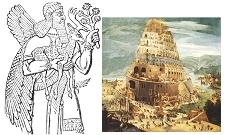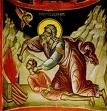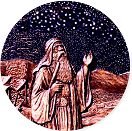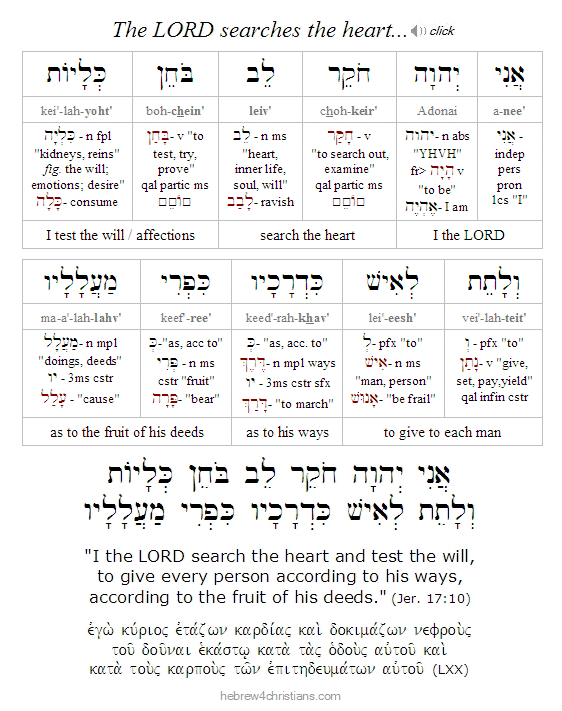|
Pirke Avot 5:3 says, "With ten tests our father Abraham was tested and he withstood them all -- in order to make known how great was our father Abraham's love for God." This week's Torah portion includes several of the ten tests of Abraham, traditionally thought to include the following events:
- The rejection of the idol worship of his father(s). A midrash relates that Abram's father sold idols for a living in the city of Haran. When Abram was a young child, however, he realized that idol worship was foolishness. One day when he was asked to watch the store, Abram took a hammer and smashed all the idols - except for the largest one. His father came home and demanded to know what happened. The iconoclast Abram replied that the idols all got into a fight and the biggest idol won. His father was angry but understood that Abram had discovered the truth of ethical monotheism. This was a severe test because Abram had to oppose his father Terach and take a stand against the idolatrous culture of his day.

- The persecution by Nimrod. Jewish tradition says that Noah gave Nimrod the skins with which God clothed Adam and Eve, and these gave him power over all the animals of the world. Hence he became a "mighty hunter" and convinced the ancient Babylonians that he was a god. Nimrod then organized the construction of the Tower of Babel (either to avoid a second flood or to "make war against heaven") and appointed himself king. He was the reigning monarch in Abram's day.

When Nimrod heard that Abram refused to worship him, he arrested him and threw him into a fiery furnace for three days. Abram survived this ordeal, but when his brother Haran was likewise tested, he was burned alive (Lot was Haran's son). Rashi notes that "Ur Kasdim" means "fire of Kasdim," referring to these events.
- Leaving his Homeland. Abram heard the Heavenly Voice command him to depart from his homeland and travel as a penitent to an unknown place (Gen. 12:1). This was an act of surrendering to the unknown... (It is noteworthy that Abram only heard the Voice at this time; as soon as he set foot in the Promised Land "the LORD appeared to him" (Gen. 12:7).

- Being Tested with Famine. Soon after arriving in the Promised Land, a famine forced Abram and Sarai to leave for Egypt (Gen. 12:10). This would have been especially difficult for Abram, especially since the LORD had promised him blessing and prosperity for his act of obedience.
- Dealing with Sarai's Abductions. His wife Sarai was abducted by Pharaoh (Gen. 12:14-15) and Abram became a victim of government sponsored injustice. This also occurred at a later time at the hands of Avimelech of Gerar (Gen. 20:2).
- Forced into Warfare. Abram's nephew Lot was abducted and he was forced to go to war to rescue him from mighty warrior kings (Gen. 14:12-16).
- The Dreadful Vision. After Abram was made party to the "Covenant between the Parts," he experienced the dreadful vision of his descendants being subjugated for 400 years (Gen. 15:1-21).
- Painful Circumcision at age 99. At Abram's advanced age, he was commanded to circumcise himself and his son Ishmael (Gen. 17:10).
- Ongoing Family Problems. The infertility of Sarai, his nephew Lot's ingratitude, the family issues surrounding Hagar, and the eventual eviction of Hagar and Ishmael from the family caused Abraham untold grief and sorrow (Gen. 21:10).
- The Ultimate Sacrifice. The Akedah - the commandment to sacrifice his son Isaac on Mount Moriah as a burnt offering (Gen. 22:1-19) was undoubtedly Abram's greatest test of all (and a divine prefigurement of the ultimate sacrifice the heavenly Father would give on our behalf).

Note: Please see the article, "Love and Sacrifice" for a closer look at the offering of Isaac (i.e., the Akedah).
Hebrew Lesson
Jeremiah 17:10 Hebrew reading (click):
<< Return to Lekh Lekha
|







